The Floor Lamp Market is estimated to be valued at USD 43.6 billion in 2025 and is projected to reach USD 140.4 billion by 2035, registering a compound annual growth rate (CAGR) of 12.4% over the forecast period.
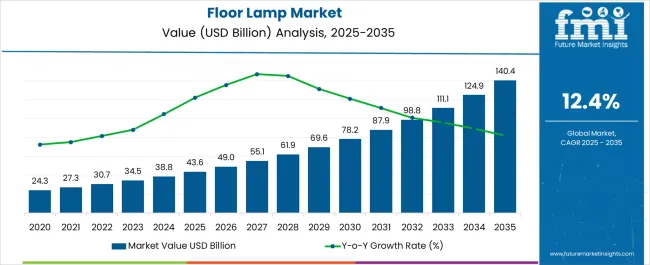
| Metric | Value |
|---|---|
| Floor Lamp Market Estimated Value in (2025 E) | USD 43.6 billion |
| Floor Lamp Market Forecast Value in (2035 F) | USD 140.4 billion |
| Forecast CAGR (2025 to 2035) | 12.4% |
The floor lamp market is demonstrating steady expansion. Rising demand for functional and decorative lighting solutions is driving adoption across residential and commercial spaces. Current dynamics are influenced by consumer preference for aesthetic designs, energy-efficient lighting systems, and versatile models that enhance both utility and interior ambiance.
The integration of smart lighting technologies and sustainable materials is further shaping product innovation. Future outlook remains positive as urbanization, lifestyle upgrades, and home décor spending are expected to strengthen demand. Manufacturers are focusing on design differentiation, cost-effective production, and distribution network expansion to cater to evolving customer expectations.
Growth rationale is anchored in the increasing relevance of floor lamps as multifunctional fixtures combining style, efficiency, and modern technology The market is also supported by expanding retail and e-commerce channels that are making a wide range of designs accessible to global consumers These factors are collectively ensuring consistent growth momentum across the forecast period.
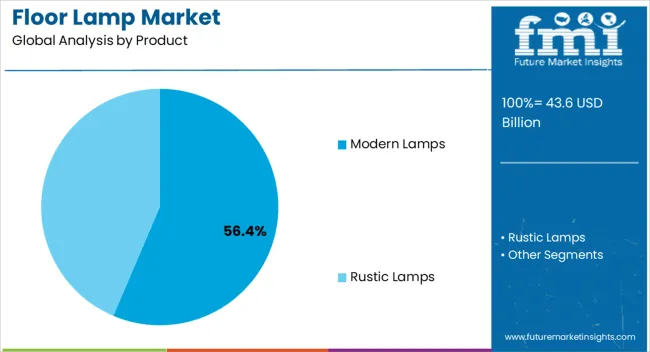
The modern lamps segment, holding 56.4% of the product category, has maintained dominance due to its alignment with contemporary interior design preferences and demand for versatile lighting options. Adoption has been supported by a shift toward minimalist and energy-efficient designs that complement modern décor themes.
Consumer willingness to invest in statement pieces for home and office interiors has further sustained market leadership. Product innovation, including integration with LED technology and smart home compatibility, has improved functionality and extended product lifecycle.
Retailers and manufacturers have capitalized on the popularity of modern lamps by diversifying product lines across price ranges Sustained consumer interest and continuous product enhancements are expected to preserve the segment’s strong market share in the coming years.
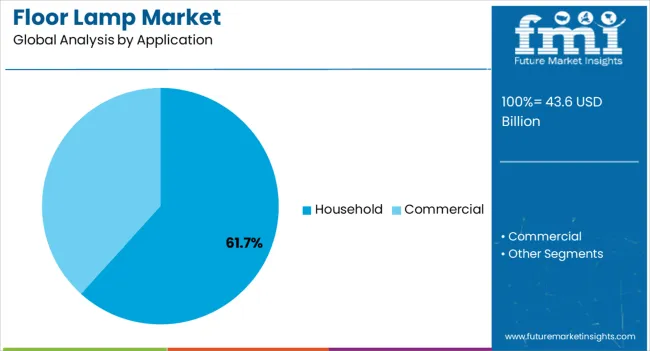
The household segment, accounting for 61.7% of the application category, has emerged as the primary demand driver due to rising home décor expenditure and emphasis on personalized living spaces. Consumers are increasingly incorporating floor lamps as both functional and decorative elements within living rooms, bedrooms, and study areas.
Growth has been reinforced by availability of customizable designs and the integration of energy-efficient technologies that align with eco-conscious preferences. Market share has been further supported by the expansion of e-commerce platforms, making a diverse range of household lighting solutions accessible.
Lifestyle changes, particularly in urban settings, are expected to fuel continued adoption The household application segment is projected to retain its leading role as consumer focus on aesthetics and sustainability intensifies.
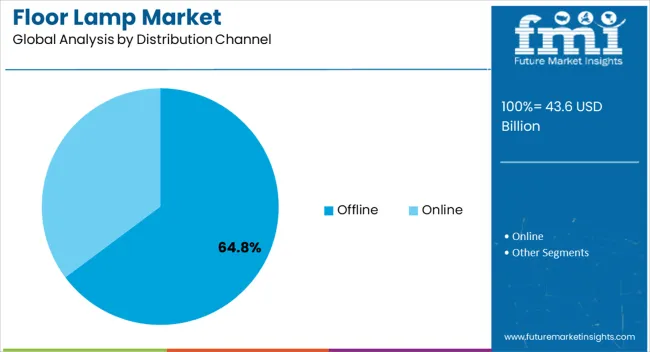
The offline distribution channel, representing 64.8% of the category, has remained dominant due to consumer preference for in-person product evaluation and direct interaction before purchase. Brick-and-mortar stores, including specialty lighting showrooms, home improvement outlets, and department stores, have been instrumental in supporting the segment’s strong presence.
Offline channels provide opportunities for product demonstrations, design consultation, and after-sales services, which have reinforced consumer trust. Growth has also been supported by manufacturers’ partnerships with large retail chains to increase market penetration.
While online sales are gaining traction, offline retail continues to command the majority share due to its ability to deliver experiential purchasing Continued investments in showroom displays and retail expansion strategies are expected to maintain the channel’s leadership in the forecast period.
The floor lamp market developed steadily due to the rising demand for energy-efficient LED technology and interior lighting solutions. Conventional designs dominated the floor lamp market during the forecast period. The popularity of smart and adjustable floor lamps increased during the historical period.
The standing lamp market is expected to advance over the forecast period. Eco-friendliness and sustainability are essential, and increasing solar-powered and recyclable options are expected to stimulate market growth. The next generation of smart lamps intends to incorporate sophisticated AI and IoT features. Customers demand individualized designs and color options, so customization is a significant trend.
With an emphasis on customization, technology, and sustainability, sales of floor lamps have the potential for innovation and expansion from 2025 to 2035.
The subsequent section contains the floor lamp categorized market overview. In-depth analyses indicate that the household segment dominates the application category, and the modern floor lamp sector is leading the product type category.
| Top Product Type | Modern Floor Lamp |
|---|---|
| Segment Share in 2025 | 36.70% |
The modern floor lamps category has taken the lead in floor lamp sales, demonstrating its dominance in the highly saturated market. It is explained by consumers' increasing inclination toward sleek, modern designs that go well with the aesthetics of contemporary interiors.
Contemporary LED floor lamps frequently incorporate sleek designs, cutting-edge materials, and modern lighting technologies to complement the changing preferences and way of life of today's consumers. The widespread appeal highlights its importance for the lighting industry to remain aware of design trends and customer needs, as the floor lamp industry is constantly changing to accommodate shifting tastes in interior design.
| Top Application | Household |
|---|---|
| Segment Share in 2025 | 38.70% |
Due to its widespread adoption for diverse residential lighting needs, the household segment leads the sales of floor lamps. The energy-efficient LED floor lamps are decorative and functional, adding depth to interior design and offering various lighting options for living areas.
Although the commercial segment holds significance of its own, the household segment is the primary determinant of floor lamp sales due to its more extensive consumer base and the personalization it offers for various domestic settings.
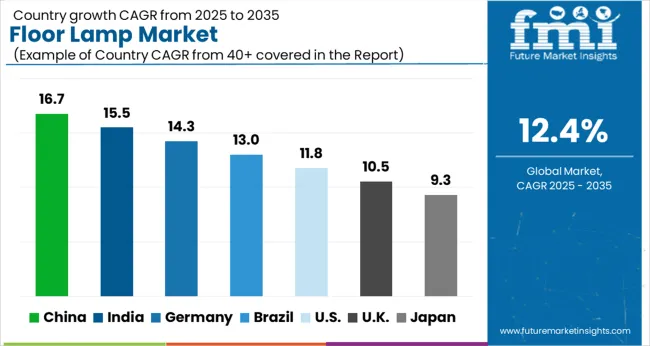
The following tables exhibit the floor lamp market growth based on the dominant economies in North America, Europe, and Asia Pacific. Upon extensive investigation, it is evident that Asia Pacific's manufacturers are incredibly resilient, providing numerous opportunities.
Tradition Meets Modernity in India Floor Lamp Market
Embracing Minimalism and Technology in the Japanese Market
Coastal Aesthetics and Eco-Consciousness of the Australia Floor Lamp Industry
Sustainable Brilliance of The Floor Lamp Market in Singapore
China's Booming Floor Lamp Market for Urbanization and Innovation
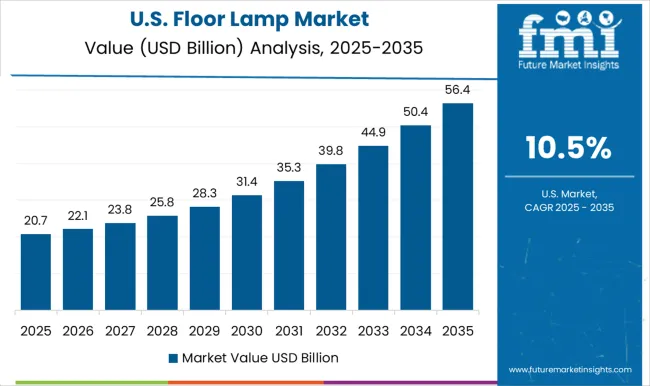
Evolving Trends in the United States Floor Lamp Market
Smart Lighting Solutions Gain Traction in Canada
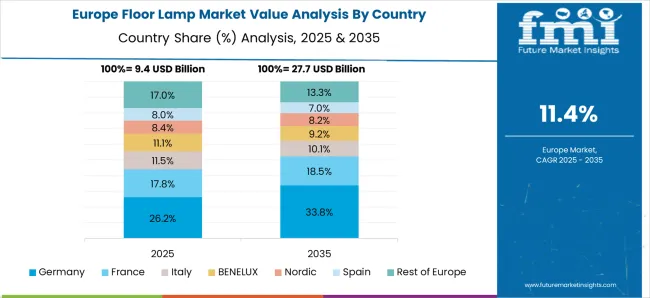
Artistry and Creativity in Floor Lamps in France
Market's Influence on Floor Lamp Designs in Spain
Smart and Energy-Efficient Lighting Trends in the United Kingdom Floor Lamp Market
Eco-Consciousness and Luxury Influences the Italy Floor Lamp Market
Sustainable Trends in the German Floor Lamp Industry
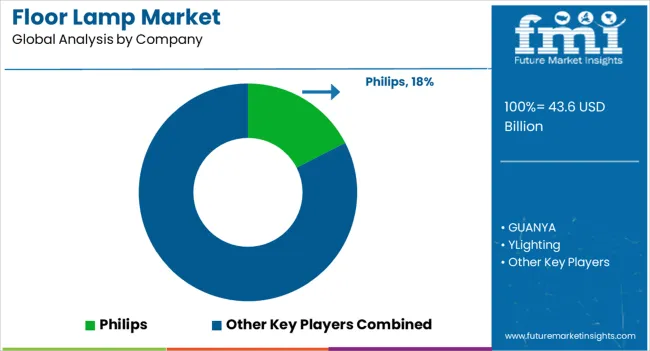
The emergence of energy-efficient floor lamps and shifting consumer preferences have intensified competition in the floor lamp market. To obtain a competitive advantage, significant floor lamp vendors use aggressive pricing tactics and creative designs.
The floor lamp manufacturers should spend on research and development to advance lamp technology and add intelligence. The floor lamp companies use eco-friendly and sustainable materials to make a statement. With their ability to provide direct-to-consumer sales channels and a wider reach, eCommerce platforms have become essential. Navigating the competitive landscape requires a focus on customer-centric approaches, branding, and timely monitoring of trends in interior lighting and floor-standing lamps.
Contemporary Developments
| Company | Details |
|---|---|
| Koninklijke Philips N.V. | The functionality of Philips' floor lamps is going to be improved with the release of new smart lighting products in 2024 to be compatible with a variety of smart home ecosystems. |
| Osram GmbH | Osram has been concentrating on energy-efficient lighting solutions and LED technology development. It added cutting-edge LED floor lamps to its growing product line. |
| IKEA Group | IKEA has unveiled some innovative floor lamp designs emphasizing style and functionality and blending perfectly with its current furniture collections. |
| Artemide S.p.A. | Artemide has been working with well-known designers to produce original floor lamp designs, upholding its reputation for producing modern lighting fixtures of the highest caliber. |
| Kichler Lighting | To increase the accessibility of its floor lamps, Kichler Lighting has been aggressively growing its distribution networks and forming alliances with lighting retailers. |
The global floor lamp market is estimated to be valued at USD 43.6 billion in 2025.
The market size for the floor lamp market is projected to reach USD 140.4 billion by 2035.
The floor lamp market is expected to grow at a 12.4% CAGR between 2025 and 2035.
The key product types in floor lamp market are modern lamps and rustic lamps.
In terms of application, household segment to command 61.7% share in the floor lamp market in 2025.






Full Research Suite comprises of:
Market outlook & trends analysis
Interviews & case studies
Strategic recommendations
Vendor profiles & capabilities analysis
5-year forecasts
8 regions and 60+ country-level data splits
Market segment data splits
12 months of continuous data updates
DELIVERED AS:
PDF EXCEL ONLINE
Floor Screed Market Size and Share Forecast Outlook 2025 to 2035
Floor Standing Filtered Bottle Filling Stations Market Size and Share Forecast Outlook 2025 to 2035
Floor Cleaner Market Size and Share Forecast Outlook 2025 to 2035
Floor Transition Strips Market Analysis - Size, Share, and Forecast Outlook 2025 to 2035
Floor Scales Market Size and Share Forecast Outlook 2025 to 2035
Floor Cleaning and Mopping Machine Market Size and Share Forecast Outlook 2025 to 2035
Floor Marking Tape Market Analysis - Size and Share Forecast Outlook 2025 to 2035
Flooring Market Size and Share Forecast Outlook 2025 to 2035
Floor Displays Market Growth from 2025 to 2035
Flooring and Carpets Market - Trends, Growth & Forecast 2025 to 2035
Floor Grinding Machine Market
Bus Flooring Market Growth – Trends & Forecast 2025 to 2035
Eco Flooring Market Analysis - Growth, Demand & Forecast 2025 to 2035
Gas Floor Fryers Market
Underfloor Heating Market Size and Share Forecast Outlook 2025 to 2035
Underfloor Air Distribution Systems Market
Vinyl Flooring Market Growth - Trends & Forecast 2025 to 2035
Pelvic Floor Diagnostics Market - Demand & Forecast 2025 to 2035
Pelvic Floor Stimulators Market – Trends & Forecast 2025 to 2035
Pelvic Floor Diagnostic Testing Market

Thank you!
You will receive an email from our Business Development Manager. Please be sure to check your SPAM/JUNK folder too.
Chat With
MaRIA